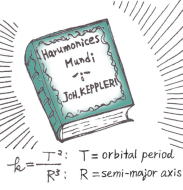-

1571 Kepler was born in Weil der Stadt, Southwest Germany. He was born 7 months premature and frail.
-

1577 Kepler witnessed the Great Comet.
-

Because his family was poor, Kepler attended school as a stipendiary student.
-

1588 Kepler desired to become a Protestant minister, so he enrolled at the University of Tübingen (School of Divinity) as a stipendiary student. His father died in the same year.
-

Maestlin taught him Copernicus' heliocentric theory, and Kepler thus decided to become an astronomer.
-

1594 After graduating from the university, Kepler became a teacher of mathematics at the Protestant school in Graz. He earned a reputation because his foretelling calendar-which he made as a part-time job-actually worked.
-

1596 Kepler published The Cosmographic Mystery (Mysterium Cosmographicum). In the book, he argues that the number of planets and their alignments could be explained in the relation of five regular polyhedra.
-

Persecution against Protestants had become more severe in Graz, so Kepler decided to leave the town.
-

1600 Kepler became an assistant of Tycho Brahe, a Danish astronomer who lived in Prague, and conducted observations of Mars under the protection of Holy Roman Emperor Rudolf II.
-

1601 Tycho died. His observation data were passed to Kepler.
-

1609 Kepler published A New Astronomy (Astronomia Nova). He wrote the book based on Tycho's data (Kepler's first and second laws).
1611 Kepler published Dioptrice.
1612 He moved to Linz and became surveyor general. -

1619 Kepler published Harmony of the Worlds (Harmonices Mundi) : Kepler's third law.
-

1620 Kepler defended his mother against a witch trial.
1626 Linz became a battlefield of the Thirty Years War. Because of persecution of Protestants, Kepler moved to Ulm. -

1630 Kepler died in Regensburg while on a journey to collect a debt.
1634 Dream (Somnium) was published by his son.
